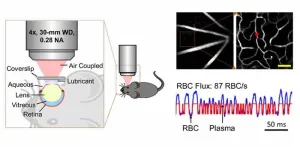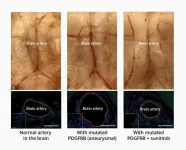(Press-News.org) People with weakened immune systems are at constant risk of infection. Pseudomonas aeruginosa, a common environmental bacterium, can colonize different body parts, such as the lungs, leading to persistent, chronic infections that can last a lifetime – a common occurrence in people with cystic fibrosis.
But the bacteria can sometimes change their behavior and enter the bloodstream, causing chronic localized infections to become acute and potentially fatal. Despite decades of studying the transition in lab environments, how and why the switch happens in humans has remained unknown.
However, researchers at the Georgia Institute of Technology have identified the major mechanism behind the transition between chronic and acute P. aeruginosa infections. Marvin Whiteley – professor in the School of Biological Sciences and Bennie H. and Nelson D. Abell Chair in Molecular and Cellular Biology – and Pengbo Cao, a postdoctoral researcher in Whiteley’s lab, discovered a gene that drives the switch. By measuring bacterial gene expression in human tissue samples, the researchers identified a biomarker for the transition.
Their research findings, published in Nature, can inform the development of future treatments for life-threatening acute infections.
According to Whiteley and Cao, bacteria, like animals, are versatile and behave differently depending on their environment. A person with a chronic infection might be fine one day, but environmental changes in the body can cause bacteria to change their behavior. This can lead to acute infection, and a person could develop sepsis that requires immediate treatment.
“For years, people have been studying these bacteria in well-controlled lab environments, even though the lab is a place most microbes have never seen,” said Whiteley. “Our study took a novel approach to look directly into the bacterium’s behavior in the human host.”
The researchers chose to look at human tissue samples of chronic bacterial lung and wound infections. Using genetic sequencing technologies, Whiteley and Cao measured the levels of all types of mRNA present in the bacteria. The mRNAs encode the proteins that do all the work in a cell, so by measuring a bacterium’s mRNA level, one can infer the bacterium’s behavior.
While P. aeruginosa has roughly 6,000 genes, Whiteley and Cao found that one gene in particular – known as PA1414 – was more highly expressed in human tissue samples than all the other thousands of genes combined. The levels were so high that, at first, Cao and Whiteley thought the amount of PA1414 mRNA might be an artifact – a glitch associated with the sequencing methods.
“This particular gene is not expressed in the standard lab environment very much, so it was striking to see these levels,” Cao said. “And at this point, the function of the gene was unknown.”
The researchers also found that low oxygen drives the high expression of the gene. This is a common environmental characteristic of bacterial infections, as bacteria frequently encounter oxygen deprivation during chronic infections. Further tests showed that the gene also regulates bacterial respiration under low oxygen conditions.
Interestingly, the researchers found that rather than encoding a protein, the gene encodes a small RNA that plays a vital role in bacterial respiration. They named the small RNA SicX (sRNA inducer of chronic infection X).
The researchers then tested the functions of the gene in different animal infection models. They observed that when SicX wasn’t present, the bacteria easily disseminated from chronic infections throughout the body, causing systemic infection. The comparison allowed the researchers to determine that the gene is important for promoting chronic localized infection. Moreover, researchers also showed that the expression of SicX immediately decreased during the transition from chronic to acute infection, suggesting SicX potentially serves as a biomarker for the chronic-to-acute switch.
“In other words, without the small RNA, the bacteria become restless and go looking for oxygen, because they need to breathe like we need to breathe,” Whiteley said. “That need causes the bacteria to enter the bloodstream. Now, we know that oxygen levels are regulating this transition.”
Having a better indication of when an infection might enter the bloodstream would be a paradigm shift for treatments.
“If you can predict when an acute infection will occur, a patient could take a diagnostic test at home to determine if and when they may need to get treatment – before the infection becomes life-threatening,” Whiteley said.
The study provides answers to the long-standing questions about how and why chronic infections become acute. The researchers’ findings also open opportunities to develop therapeutics that target this specific molecular behavior associated with P. aeruginosa infections.
“The chronic Pseudomonas infection is usually highly resistant to first-line antibiotics,” Cao said. “By targeting this small RNA, we could potentially change the lifestyle of the bacteria to make it more susceptible to antibiotic treatments and achieve greater clearance of these dangerous infections.”
Citation: Cao, P., Fleming, D., Moustafa, D.A., et al. A Pseudomonas aeruginosa small RNA regulates chronic and acute infection. Nature 618, 358–364 (2023).
DOI: https://doi.org/10.1038/s41586-023-06111-7
Writer: Catherine Barzler, Georgia Institute of Technology
#######
The Georgia Institute of Technology, or Georgia Tech, is one of the top public research universities in the U.S., developing leaders who advance technology and improve the human condition. The Institute offers business, computing, design, engineering, liberal arts, and sciences degrees. Its more than 45,000 undergraduate and graduate students, representing 50 states and more than 148 countries, study at the main campus in Atlanta, at campuses in France and China, and through distance and online learning. As a leading technological university, Georgia Tech is an engine of economic development for Georgia, the Southeast, and the nation, conducting more than $1 billion in research annually for government, industry, and society.
END
Scientists discover small RNA that regulates bacterial infection
2023-06-14
ELSE PRESS RELEASES FROM THIS DATE:
Making immunotherapy safer
2023-06-14
Researchers at the University of Houston are working to make T-cell immunotherapy safer, developing a tool called CrossDome, which uses a combination of genetic and biochemical information to predict if T-cell immunotherapies might mistakenly attack healthy cells.
T-cell based immunotherapies hold tremendous potential in the fight against cancer and infectious diseases, thanks to their capacity to specifically target diseased cells, including cancer metastasis. Nevertheless, this potential has been tempered with safety concerns regarding ...
Eyeing the brain: Predicting cerebrovascular diseases with retinal imaging
2023-06-14
The brain is one of the most metabolically active organs in the human body. Although it represents only about 2 percent of the human body’s weight, it receives 15 to 20 percent of the body’s total blood supply. Disrupted blood flow to the brain over a long period of time, a condition known as “chronic cerebral hypoperfusion” (CCH), can lead to serious cerebrovascular diseases such as white matter disease.
CCH manifests as lesions in the white matter, a brain region vulnerable to problems with blood supply. Unfortunately, CCH has no available cure. An early diagnosis by visualizing the microvascular changes in the brain that occur prior to lesion ...
Phone Menu Test Detects Who May Be at Risk of Alzheimer’s Disease
2023-06-14
A new study by investigators from Mass General Brigham has found that a brief, simulated task of navigating a phone menu can detect the earliest changes in daily functioning in people at risk of developing Alzheimer’s disease. Investigators found that an older adult’s performance on the test, which can be completed in a matter of minutes, was associated with the hallmarks of Alzheimer’s disease pathology, including amyloid and tau depositions in the brain. The findings, which were published in the Journal of Alzheimer’s Disease, could help inform prevention trials testing treatments for Alzheimer’s disease before ...
When local economic inequality is high, the rich tend to be more generous
2023-06-14
Rich individuals living in communities with greater levels of economic inequality tend to be more generous with charitable giving and prosocial behaviors, according to a study published June 14, 2023 in the open-access journal PLOS ONE by Joel H. Suss from the London School of Economics & Political Science and Bank of England, UK.
Many studies have attempted to assess whether the rich are more or less generous than the poor, and whether this shifts depending on the starkness of economic inequality. Thus far, the results have been inconclusive. Previous work in this vein has been conducted at a macro level, using state, region, and country-level aggregated data. In this study, Suss ...
Ocean current comes to the rescue for Pacific island reefs
2023-06-14
Marine heatwaves are emerging as a key impact of climate change and pose a particularly significant threat to corals that form the backbone of coral reefs. Researchers have now identified a phenomenon that could help coral reef managers better plan and act for the future.[1]
Every few years, the cyclic climate pattern called El Niño arises in the tropical Pacific, causing significant changes in winds, weather and ocean temperatures. From April 2015 to May 2016, the Central Pacific witnessed one of the strongest El Niño events ever recorded.
Coral reefs were so stressed by the warmer ocean temperatures that they experienced mass bleaching, whereby the ...
'Smart' drugs can decrease productivity in people who don't have ADHD, study finds
2023-06-14
New research from the University of Cambridge and the University of Melbourne, published in Science Advances, shows neurotypical workers and students taking cognitive enhancers, or ‘smart’ drugs, may actually be inhibiting their performance and productivity.
Drugs such as methylphenidate, sold under the brand name Ritalin among others, are commonly prescribed for attention deficit hyperactivity disorder (ADHD), but are also taken by those without a diagnosis, in the belief that the drugs will enhance focus and cognitive performance.
In four double-blinded, ...
The mutant origin of brain aneurysms and the first drug treatment
2023-06-14
Researchers at the RIKEN Center for Brain Science (CBS) in Japan have discovered a set of related mutations that lead to intracranial aneurysms—weakened blood vessels in the brain that can burst at any time. The mutations all appear to act on the same biological signaling pathway, and the researchers report the first ever pharmaceutical treatment in a mouse model, which works by blocking this signal. The study was published in Science Translational Medicine on June 14.
About 5% of the population have unruptured intracranial aneurysms in blood vessels on the surface of the brain. Despite being ballooned arteries with ...
Massive hemorrhages are often deadly. Can a perfume ingredient stop the bleed and save lives?
2023-06-14
The chances of surviving massive blood loss from a traumatic injury such as a gunshot wound are around 50 percent. To survive, a patient needs two things to happen quickly: a large infusion of blood and coagulation at the wound to stop the bleeding.
The problem is one of these solutions prevents the other. Introducing a large amount of blood to those suffering a massive hemorrhage impairs the blood’s ability to clot, a condition known as coagulopathy.
Now, Tulane University researchers have uncovered the cause of coagulopathy in trauma victims receiving a blood infusion. They also found that a synthetic compound ...
Altered gut bacteria may be early sign of Alzheimer’s disease
2023-06-14
People in the earliest stage of Alzheimer’s disease — after brain changes have begun but before cognitive symptoms become apparent — harbor an assortment of bacteria in their intestines that differs from the gut bacteria of healthy people, according to a study by researchers at Washington University School of Medicine in St. Louis.
The findings, published June 14 in Science Translational Medicine, open up the possibility of analyzing the gut bacterial community to identify people at higher risk of developing dementia, and of designing microbiome-altering preventive treatments to stave off cognitive decline.
“We don’t yet know ...
Elimination of type of bacteria suggests treatment for endometriosis
2023-06-14
A research group from the Graduate School of Medicine and iGCORE at Nagoya University in Japan, has discovered that using an antibiotic to target Fusobacterium reduced the formation of lesions associated with endometriosis, a gynecological disorder characterized by endometrial tissue usually found inside the uterus being found outside it. Their findings suggest an alternative treatment for this disorder. The study was published in Science Translational Medicine.
Endometriosis affects one in ten women between the ages of 15 and 49. The disorder can cause lifelong health problems, including pelvic pain and infertility. ...






